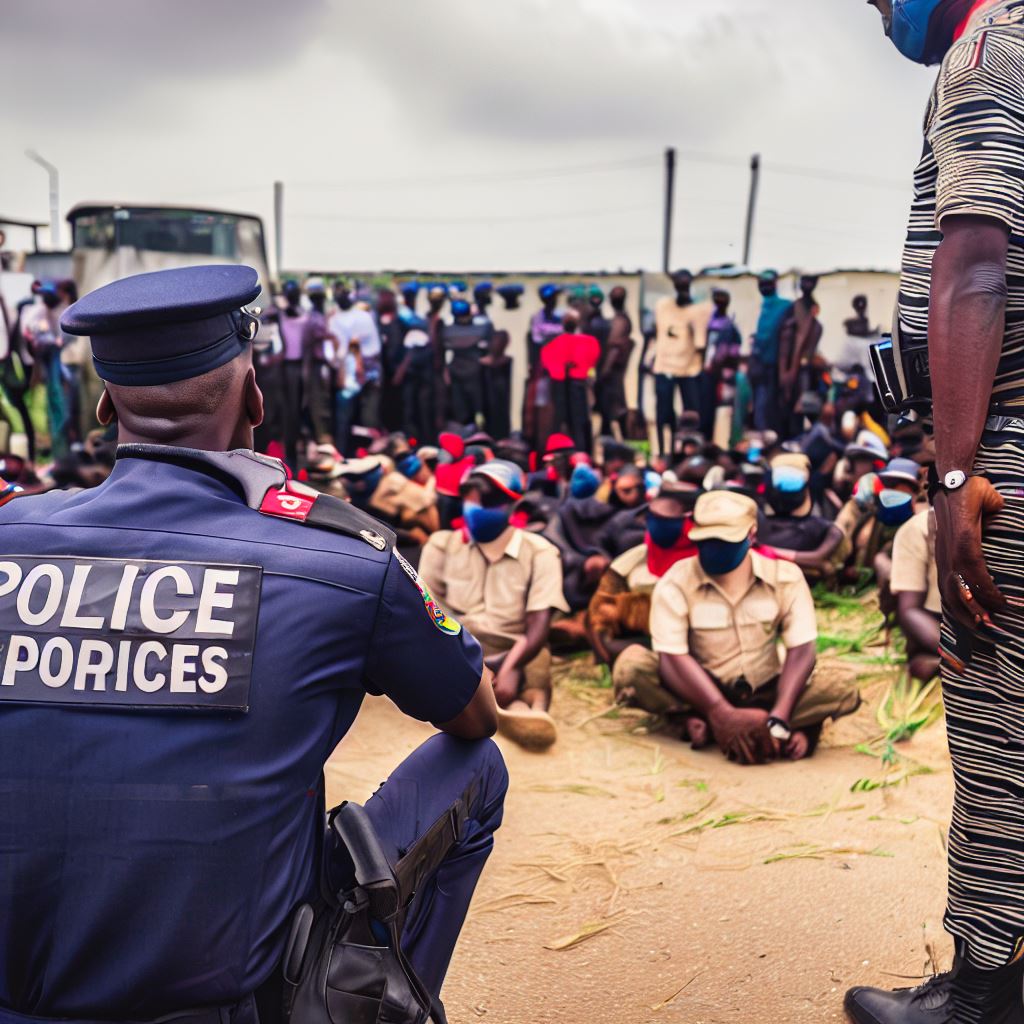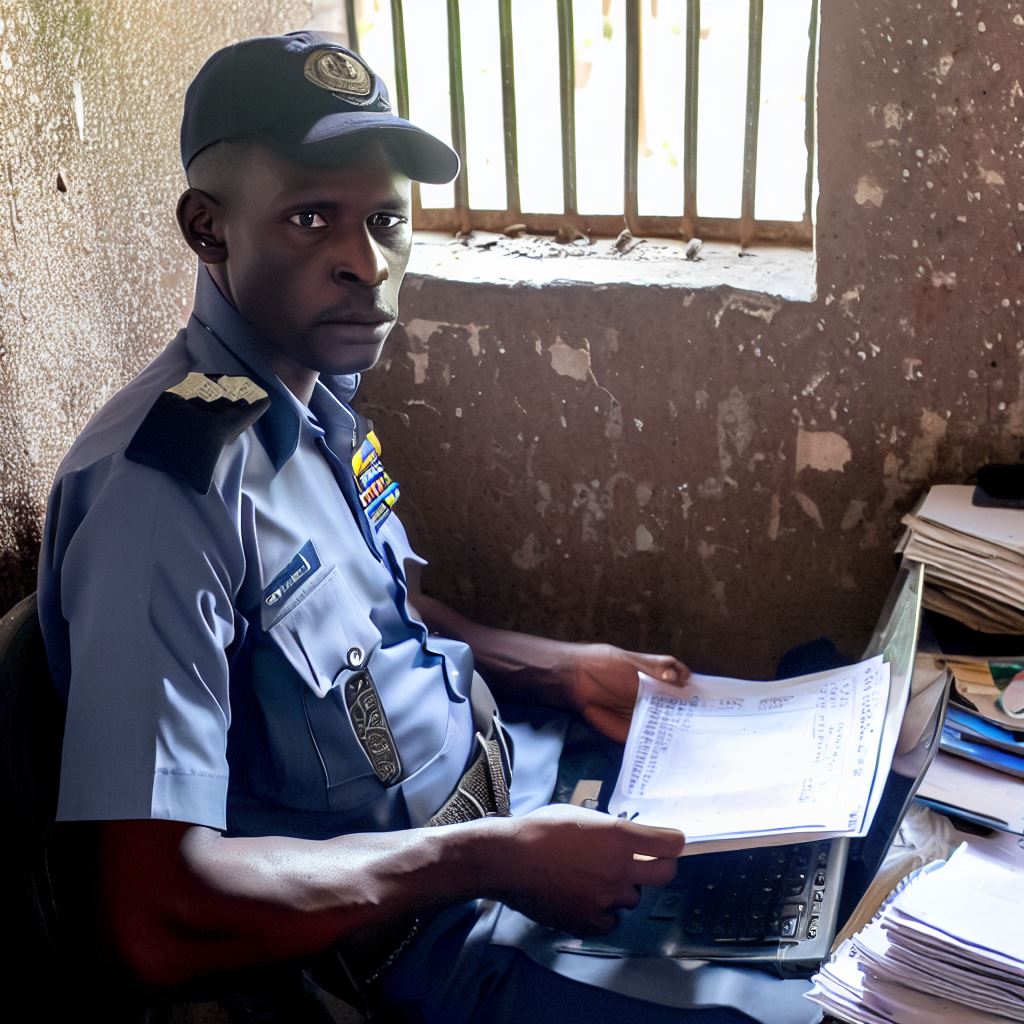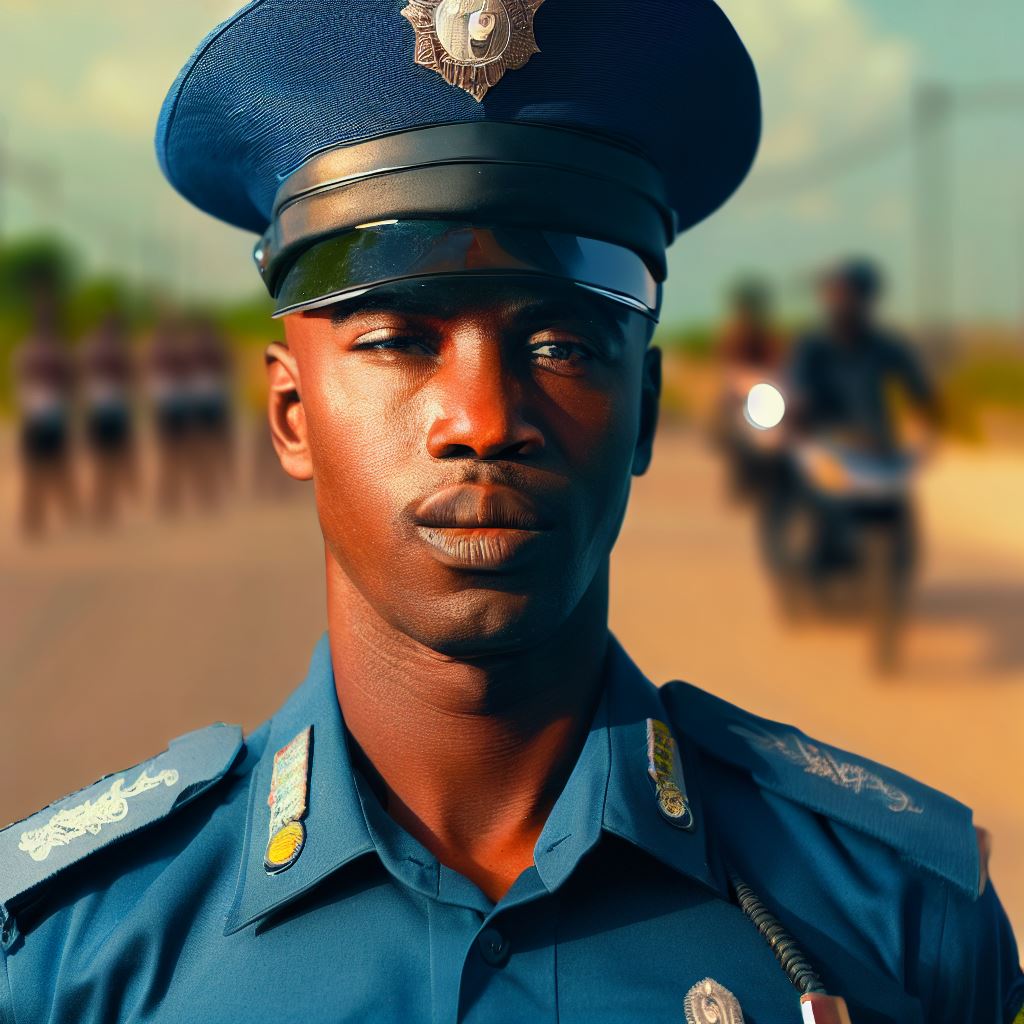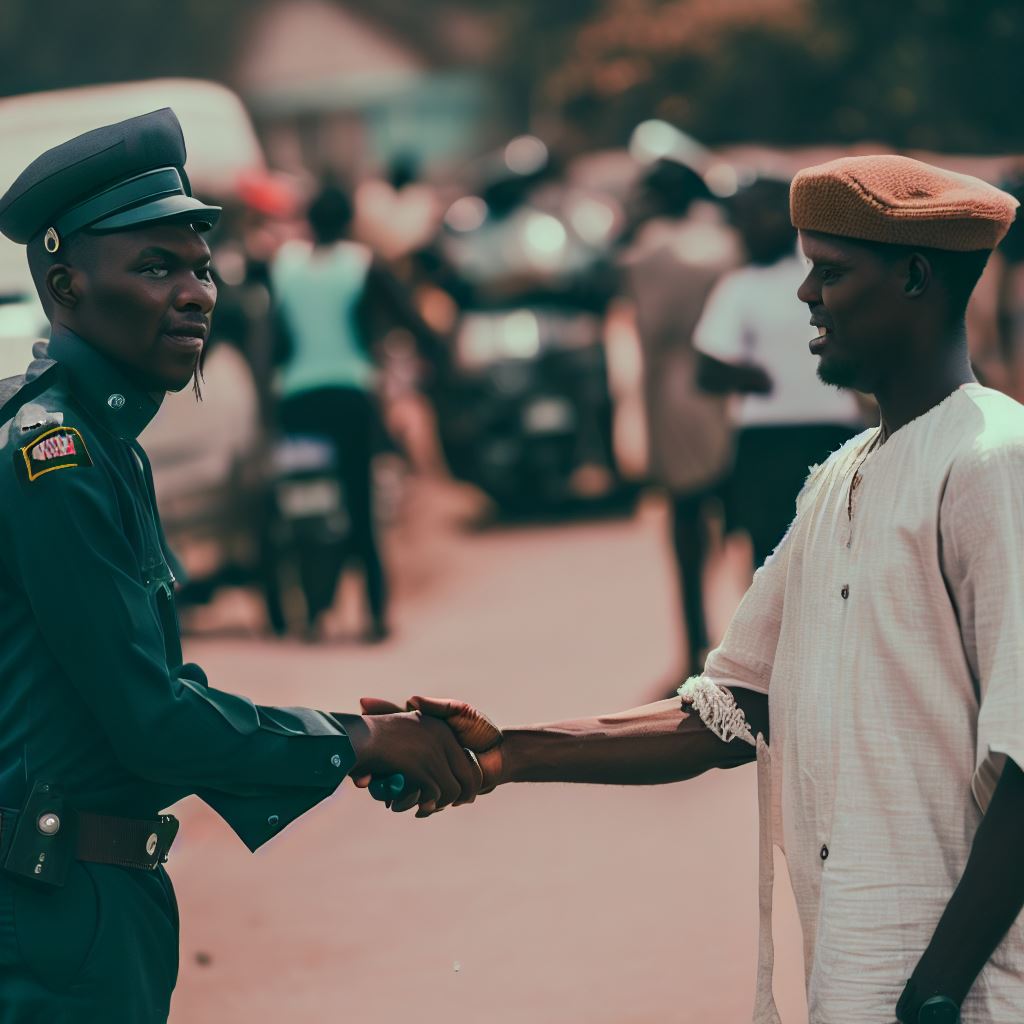Introduction
Police officers play a crucial role in maintaining law and order in Nigeria. Understanding the qualifications needed to become a police officer in Nigeria is essential.
Police officers are responsible for protecting lives and property, maintaining peace, and enforcing the law.
To become a police officer in Nigeria, one must meet specific qualifications and undergo rigorous training.
The minimum educational requirement is a secondary school certificate or its equivalent. Candidates must be between the ages of 18 and 25 and have good physical and mental health.
They must also be of Nigerian nationality and have no previous criminal record. To apply, candidates must obtain and fill out the application form from the Police Service Commission.
Upon submission, applicants are required to undergo a series of physical and written tests. These tests assess the candidate’s physical fitness, intelligence, and basic understanding of the law.
Successful candidates proceed to the next stage, which includes medical examinations and interviews.
After passing all the stages, candidates are admitted into the Nigeria Police Academy for training.
The training period lasts for about six months and covers various aspects, including firearms handling and crowd control.
Upon graduation, individuals become police officers and are allocated to different units based on their skills and interests.
In essence, becoming a police officer in Nigeria requires meeting specific qualifications and undergoing rigorous training.
Education Requirements
Education plays a crucial role in shaping individuals who aspire to become police officers in Nigeria.
The Nigerian Police Force recognizes the importance of a solid educational background in preparing individuals for the challenges of law enforcement.
The education requirements for becoming a police officer in Nigeria are detailed below.
A. Completion of secondary education
The first step towards becoming a police officer in Nigeria is the successful completion of secondary education.
Transform Your Career in Nigeria
Discover unmatched expertise with our personalized Career Consulting service. Navigate Nigeria’s job market with a strategy tailored just for you.
Get StartedThis requirement ensures that candidates have a basic level of knowledge and skills necessary to serve effectively as police officers.
Secondary education, also known as high school education, provides individuals with a foundation in various subjects, including mathematics, English, science, and social sciences.
The curriculum equips students with critical thinking abilities, communication skills, and a basic understanding of societal norms and values.
B. Possession of a minimum of five credits in WASSCE or NECO
In addition to completing secondary education, aspiring police officers in Nigeria must possess a minimum of five credits in their West African Senior School Certificate Examination (WASSCE) or National Examination Council (NECO) exams.
The WASSCE and NECO exams are standardized examinations taken by students in various West African countries, including Nigeria.
These exams assess students’ knowledge and understanding of subjects such as English, mathematics, sciences, and social sciences.
By requiring a minimum of five credits in these exams, the Nigerian Police Force ensures that individuals who wish to become police officers possess a certain level of academic achievement.
This requirement ensures that candidates have a solid educational foundation to support them in their law enforcement careers.
C. Obtaining a degree in criminology or a related field is advantageous
While it is not mandatory, obtaining a degree in criminology or a related field can provide aspiring police officers in Nigeria with an advantage in their career path.
A degree in criminology equips individuals with a deeper understanding of crime, criminal behavior, and the criminal justice system.
It enhances their analytical skills, critical thinking abilities, and knowledge of law enforcement practices.
This additional education can contribute to their effectiveness as police officers, enabling them to handle complex situations more efficiently.
Moreover, a degree in criminology or a related field demonstrates a commitment to learning and professional development.
It showcases an individual’s dedication to the field of law enforcement and their willingness to acquire specialized knowledge and skills.
While a degree in criminology can be advantageous, it is important to note that it is not a strict requirement for becoming a police officer in Nigeria.
The Nigerian Police Force values a diverse range of educational backgrounds, recognizing that skills and expertise can be gained through various avenues.
In fact, the education requirements for becoming a police officer in Nigeria include the completion of secondary education, possession of a minimum of five credits in WASSCE or NECO exams, and the advantage of obtaining a degree in criminology or a related field.
By emphasizing the importance of education, the Nigerian Police Force aims to ensure that its officers are well-prepared to serve and protect the community.
Read: Nigeria Police Force: Equipment and Technological Tools
Age and Citizenship Requirements
A. Age requirement
To become a police officer in Nigeria, one must meet the age requirement, which is between 18 and 25 years old.
This ensures that applicants are young and physically fit to handle the demands of the job.
Being within the age range of 18 to 25 years is essential because it ensures that individuals have the energy and vitality required for police work.
Law enforcement demands physical fitness, alertness, and the ability to handle challenging situations.
Younger candidates are generally more adept at adapting to the dynamic nature of police work and can undergo the necessary training to excel in their roles.
Publish Your Professional Profile, Business or Brand
Showcase your expertise, gain trust, and boost visibility instantly on Professions.ng.
Publish NowB. Nigerian citizenship is mandatory
Another qualification needed to become a police officer in Nigeria is Nigerian citizenship. Only Nigerian citizens are eligible to join the police force and serve the nation.
Citizenship is a crucial requirement as it demonstrates a commitment to the nation and its people.
By limiting police officer positions to Nigerian citizens, the government ensures that those entrusted with maintaining law and order have a vested interest in the well-being of the country.
This requirement also prevents the infiltration of foreigners who may have ulterior motives or lack loyalty to Nigeria.
By having Nigerian citizenship as a prerequisite, the police force can be assured that officers possess a deep understanding of local customs, traditions, and challenges.
This familiarity helps in bridging the gap between the police and the community, enabling effective communication and cooperation in maintaining peace and security.
Moreover, being a Nigerian citizen allows police officers to have a sense of belonging and pride in serving their own country.
It enhances their dedication and commitment to protecting fellow citizens, as they strive for a safer and more secure environment.
These two requirements play a crucial role in ensuring that the police force in Nigeria is composed of capable individuals who are committed to upholding law and order.
In short, aspiring police officers in Nigeria must meet age and citizenship requirements to qualify for the job.
The age requirement of 18 to 25 years ensures physical fitness and the capacity to handle the demands of law enforcement.
Nigerian citizenship is mandatory to foster loyalty, understanding, and a sense of responsibility towards the nation.
These qualifications are vital for building a capable and dedicated police force that serves and protects the people of Nigeria.
Read: The Fight Against Corruption within the Nigerian Police
Physical Fitness Standards
A. Passing the physical fitness examination
To become a police officer in Nigeria, one must successfully pass a physical fitness examination.
This examination evaluates an individual’s overall physical fitness and ability to perform job-related tasks.
By implementing these standards, the Nigerian police force aims to enhance its overall effectiveness and professionalism.
Physically fit officers are more likely to respond effectively in emergency situations, pursue suspects, and uphold public order.
Furthermore, physical fitness is closely linked to mental and emotional well-being.
Police officers often face stressful situations, and their physical fitness can contribute to better resilience and overall job performance.
To meet the physical fitness standards, aspiring police officers can prepare themselves through regular physical exercise and training.
Engaging in activities such as running, weightlifting, and cardiovascular workouts can help improve endurance, strength, and overall fitness levels.
B. Meeting the height and weight criteria
Candidates aspiring to join the Nigerian police force must also meet specific height and weight requirements.
These requirements are put in place to ensure that individuals have the appropriate physical stature to effectively carry out their duties.
C. Demonstrating physical endurance and stamina
Physical endurance and stamina are crucial attributes for a police officer in Nigeria.
As law enforcement professionals, they must be able to handle physically demanding situations and sustain their physical efforts for extended periods.
In order to assess an individual’s physical endurance and stamina, various tests may be conducted during the recruitment process.
These tests typically involve activities such as running, obstacle courses, and other physically challenging exercises.
Candidates must display their ability to perform these tasks efficiently and effectively, proving that they have the necessary physical attributes to excel in their role as police officers.
The physical fitness standards for Nigerian police officers are not meant to be overly demanding or discriminatory.
Instead, they are designed to ensure that individuals can effectively perform the duties and responsibilities of a police officer, maintaining the safety and security of the community.
Candidates should also adopt a healthy lifestyle by maintaining a balanced diet and avoiding harmful habits such as smoking or excessive alcohol consumption.
These lifestyle choices contribute to an individual’s overall physical well-being, making them better suited for the demands of police work.
In general, physical fitness is an essential requirement for individuals seeking to become police officers in Nigeria.
Meeting the physical fitness standards ensures that officers can effectively carry out their duties, promote public safety, and contribute to the overall professionalism of the Nigerian police force.
By maintaining good physical health, candidates can enhance their chances of successfully qualifying and becoming valued members of the law enforcement community.
Read: Women in Nigeria’s Police Force: Roles and Opportunities
Medical and Psychological Assessments
To ensure the effectiveness and efficiency of police officers in Nigeria, candidates must undergo rigorous medical and psychological assessments.
These assessments are designed to evaluate their physical and mental capabilities, ensuring they are fit for duty and capable of handling the demands of the job.
In this section, we will explore the medical and psychological qualifications needed to become a police officer in Nigeria.
Publish Your Professional Profile, Business or Brand
Showcase your expertise, gain trust, and boost visibility instantly on Professions.ng.
Publish NowA. Undergoing a comprehensive medical examination
One of the essential requirements to become a police officer in Nigeria is to undergo a comprehensive medical examination.
This examination aims to determine the candidate’s physical fitness and health status.
It involves various tests and screenings to identify any underlying medical conditions that may pose a risk to the candidate’s ability to perform their duties effectively.
The examination is usually conducted by qualified medical professionals and may include blood tests, X-rays, and physical fitness assessments.
B. Being mentally and emotionally stable
In addition to physical fitness, candidates must also demonstrate mental and emotional stability.
Law enforcement can be a highly stressful and demanding profession, requiring individuals to make split-second decisions and handle challenging situations.
Therefore, it is crucial for police officers to have the mental and emotional resilience to cope with these pressures.
Psychological assessments are conducted to evaluate a candidate’s mental health, resilience, and ability to handle stress effectively.
This assessment may involve interviews, questionnaires, and psychological evaluations carried out by trained psychologists.
C. Absence of any visual or hearing impairments
Good vision and hearing are vital for police officers to perform their duties effectively and ensure their own safety and the safety of others.
Therefore, candidates are required to have a clear visual and auditory capacity.
Any visual impairments, such as poor eyesight or color blindness, can hinder their ability to respond to emergency situations accurately.
Similarly, hearing impairments may affect their ability to communicate effectively with colleagues and members of the public.
Candidates must undergo vision and hearing tests to ensure they meet the necessary standards for the job.
In review, becoming a police officer in Nigeria requires candidates to undergo comprehensive medical and psychological assessments.
These assessments aim to ensure that candidates are physically fit, mentally and emotionally stable, and free from any visual or hearing impairments that may hinder their ability to perform their duties effectively.
By setting high medical and psychological standards, Nigeria can ensure that its police force consists of capable and competent individuals who can uphold the law and protect the citizens with diligence and professionalism.
Read: Police Welfare and Benefits: An Insight into Nigeria

Background and Character Checks
Obtaining a career as a police officer in Nigeria requires meeting specific qualifications.
In addition to educational requirements, aspiring individuals must go through a series of background and character checks to ensure their suitability for the role.
This section will explore the different aspects involved in these checks.
A. Providing a clean criminal record
To become a police officer in Nigeria, one must submit a criminal record clearance certificate.
One of the essential requirements in becoming a police officer in Nigeria is to provide a clean criminal record.
Applicants must present a certificate of criminal record clearance, indicating that they have not been involved in any criminal activities.
This verification is crucial to establish trustworthiness and maintain public confidence in the police force.
B. Demonstrating good moral character
Applicants must show evidence of being upright, responsible, and possessing strong moral values.
Along with a clean criminal record, applicants must demonstrate good moral character.
They should exhibit responsible behavior and upright values, as the police force requires individuals who can serve as ethical role models for the community.
This assessment aims to ensure that potential police officers possess the necessary qualities to uphold the law and protect citizens.
Background checks assess an individual’s reputation and investigate any prior incidents that may call into question their suitability for the position.
These background and character checks hold immense importance in the recruitment process of police officers in Nigeria.
The Nigerian Police Force aims to create a team of officers who have the trust and respect of the public, and who can uphold the law with integrity.
C. Showing integrity, honesty, and ethical behavior
Prospective police officers must display ethical conduct and exhibit honesty in their personal and professional lives. The Nigerian Police Force values integrity, honesty, and ethical behavior.
Aspiring police officers must exemplify these traits in their personal and professional lives. They should be honest, trustworthy, and committed to upholding the law without bias or corruption.
By requiring a clean criminal record, the police force ensures that those who join the ranks are individuals of good standing within society.
This minimizes the risk of corruption and misconduct, upholding the fundamental principles of justice and fairness.
Demonstrating good moral character is equally vital in order to maintain public trust.
Police officers act as representatives of the law and justice, and their behavior should reflect the highest moral standards.
Communities must feel confident that those entrusted with protecting them are individuals of integrity.
The final aspect of background checks focuses on integrity, honesty, and ethical behavior. The police force cannot tolerate officers who engage in unethical practices or take advantage of their positions.
Publish Your Professional Profile, Business or Brand
Showcase your expertise, gain trust, and boost visibility instantly on Professions.ng.
Publish NowBy thoroughly evaluating an applicant’s reputation and conducting thorough investigations, the Nigerian Police Force strives to ensure the selection of individuals who will remain true to their duty.
Overall, the background and character checks play a significant role in shaping the Nigerian Police Force.
These checks guarantee that only deserving and trustworthy individuals become police officers, instilling confidence in the public and maintaining law and order.
Training and Certification
A. Enrolling in the Nigerian Police Academy or Police Training School
- Meet the minimum educational requirements, such as having a high school diploma or its equivalent.
- Submit an application to the Nigerian Police Force, indicating your interest in becoming a police officer.
- Pass the required entrance examination, which includes written tests, physical fitness assessments, and medical evaluations.
- If successful, receive an offer of admission to either the Nigerian Police Academy or a Police Training School.
B. Completing the training program successfully
- Attend the training program at the Nigerian Police Academy or Police Training School.
- Undergo rigorous physical and mental training to prepare for the challenges of police work.
- Participate in classroom lectures and practical exercises to acquire the necessary knowledge and skills.
- Learn about various aspects of policing, including law enforcement techniques, investigation methods, and community relations.
- Successfully complete all required courses and pass any assessments to progress through the training program.
- Demonstrate proficiency in firearms handling, self-defense tactics, and emergency response procedures.
C. Obtaining necessary certifications to begin police duty
- Obtain a Certificate of Police Training upon graduating from the Nigerian Police Academy or Police Training School.
- Apply for a Police Performance Evaluation Report, which assesses your performance during training.
- Successfully pass the Police Performance Evaluation Report to be deemed ready for police duty.
- Complete additional certifications, such as first aid training or specialized courses in areas like cybercrime or counterterrorism.
- Apply for and obtain an official appointment as a police officer in the Nigerian Police Force.
- Take an oath of office, committing to uphold the law, protect citizens, and maintain order in society.
By completing the training and certification process, aspiring police officers in Nigeria can fulfill their dream of serving and protecting their communities.
The rigorous training equips them with the necessary skills and knowledge to handle the challenges that come with law enforcement.
These dedicated individuals are prepared to maintain peace, uphold justice, and make a positive impact on society.
Additional Required Skills
A. Effective communication skills
As a police officer, being able to communicate effectively is crucial. Whether it’s speaking with colleagues or interacting with the public, clear communication is essential for maintaining order and resolving conflicts.
Effective communication skills are vital in the field of law enforcement. Police officers must be able to communicate clearly and concisely with colleagues, superiors, witnesses, victims, and suspects.
Whether it’s providing instructions to fellow officers during a high-stress situation or giving evidence in court, effective communication is crucial for ensuring that information is accurately conveyed.
B. Proficiency in English and local languages
In Nigeria, fluency in English is necessary due to its status as the official language.
However, being able to communicate in local languages is equally important as it helps build trust and establish rapport with the community.
In addition to English proficiency, police officers in Nigeria should also be well-versed in local languages.
This is particularly important when dealing with diverse communities where English may not be the primary language spoken.
Being able to communicate fluently in local languages helps to bridge cultural gaps and build trust with community members.
It also makes it easier to gather information, conduct interviews, and understand the needs and concerns of the local population.
C. Problem-solving abilities and critical thinking skills
Police officers often find themselves faced with complex and challenging situations that require the ability to think quickly and make sound decisions.
Problem-solving skills and critical thinking are essential for resolving conflicts and protecting the public.
Problem-solving abilities and critical thinking skills are essential for police officers to effectively carry out their duties.
They must be able to analyze complex situations, gather relevant information, and make informed decisions under pressure.
This could involve diffusing tense situations, investigating crimes, or mediating disputes.
By being able to think critically and evaluate various options, police officers can ensure the safety and well-being of both themselves and the public.
These additional skills go hand in hand with the core qualifications needed to become a police officer in Nigeria.
While meeting the basic requirements such as educational background, physical fitness, and character assessment are necessary, possessing effective communication skills, language proficiency, and problem-solving abilities enhance an officer’s overall effectiveness.
To further develop these skills, aspiring police officers can undergo specialized training programs and courses that focus on communication techniques, language immersion, problem-solving strategies, and critical thinking exercises.
These programs provide practical knowledge and hands-on experience that prepare officers for the challenges they will face on the job.
In a nutshell, becoming a police officer in Nigeria requires more than just meeting the basic qualifications.
Effective communication skills, proficiency in English and local languages, as well as problem-solving and critical thinking abilities, are crucial in maintaining law and order.
By possessing these additional skills, police officers can better serve their communities and ensure the safety and security of the nation.
Conclusion
A. Recap of the qualifications needed to become a police officer in Nigeria
- Minimum age of 17 and maximum age of 25
- Nigerian citizenship
- Minimum of five credits in WASSCE or NECO
- Physical and mental fitness
- Good character and moral conduct
B. Emphasizing the importance of meeting these requirements for a successful career in law enforcement in Nigeria
Meeting the qualifications ensures that only capable and dedicated individuals join the police force.
Physical and mental fitness are crucial for handling the demanding tasks and stressful situations.
Having a good character and moral conduct helps maintain the public’s trust and confidence in the police.
Education plays a vital role in building the necessary skills and knowledge required for effective law enforcement.
By meeting these requirements, individuals can contribute significantly to maintaining law and order in Nigeria.
Choosing a career in law enforcement requires dedication, commitment, and a strong sense of duty.
Being a police officer offers opportunities for personal growth, professional development, and serving the community.
It is essential to recognize the responsibility that comes with the badge and uphold the highest standards of integrity.
While the qualifications may seem stringent, they ensure that only the best candidates are entrusted with public safety.
Individuals should focus on meeting these requirements to increase their chances of a successful career in policing in Nigeria.
By fulfilling the qualifications, aspiring police officers can contribute to building a safer and more secure society.




